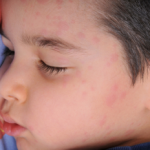Mumps Symptoms in Children
 Mumps is a contagious disease which usually affects the salivary glands called parotids. There are three pairs of salivary, one on each side. Sometimes the other salivary glands, testicles (in case of boys) and ovaries (in the case of girls) or the brain may be involved.
Mumps is a contagious disease which usually affects the salivary glands called parotids. There are three pairs of salivary, one on each side. Sometimes the other salivary glands, testicles (in case of boys) and ovaries (in the case of girls) or the brain may be involved.
The incubation period for mumps is generally two to three weeks though it can stretch to twenty five days.
The duration of the disease is for about 12 days and the swelling in the parotid glands disappear in about a week. Both glands do not swell at the same time.
Mumps is caused by a virus and is most contagious two days before and six days after the symptoms begin to show. When someone who is infected coughs, sneezes or talks, tiny droplets of fluid escape from his nose and mouth the virus in them infects those nearby. Glasses and spoons which the infected person has used can also spread the virus. Those caring for the patient can get infected when they come in direct contact on articles of clothing on which the virus is present.
Mumps symptoms in babies
The first symptoms of mumps are fever of about 102°F and headache. Swelling of the parotid glands, with consequent swelling on the side of the face, and pain in them begins. Over a period of three days the swelling increases and so does the pain. Swallowing, chewing food and talking become difficult. Acidic juices like orange and grape fruit make the pain worst. Salivary glands are found under the tongue and jaw too and if they are affected, swelling may be seen in these places and even in front of the chest.
There may be some complications like inflammation of the brain, encephalitis, or inflammation of the lining of the brain and spinal cord, meningitis. These are rare complications and occur in a week’s time after the parotid glands swell. Signs of the brain being affected are headache, high fever, stiff neck, nausea, vomiting and convulsions. The patient may want to sleep most of the time.
Orchitis or inflammation of the testicles is a complication seen in adolescent males. About a week after the parotids swell, one testicle become swollen and painful. If the right testicle is affected, the pain is often mistaken for appendicitis as it spreads to the abdomen. Other symptoms are high fever, chills, nausea, vomiting and headache. After four to seven days the fever and testicular swelling and pain lessens. Sometimes both the testicles are involved but sterility is a rare complication.
In females the ovaries may be affected and there may be tenderness and pain in the abdomen.
The pancreas is another organ which can be involved. Some people do not even realise they have mumps because the symptoms are so mild.
Kids mumps treatment
Mumps cannot be treated with antibiotics as they are caused by a virus. Consult a doctor if your child shows any symptoms of mumps and according to his advice you can give medicine to bring down fever and lessen pain in the swollen glands. Aspirin should not be given because it may cause Reye syndrome in children which can lead to liver failure.
Give the child soft foods which do not require chewing. Avoid spices and acidic liquids like lemonade as they will serve to make the pain worse. Give plenty of fluids like water, tea and decaffeinated drinks. Pain in the swollen parotids will be relieved with warm or cold packs.
Stronger medication will be advised by the doctor if there is swelling and pain in the testicles. Ask the doctor how extra support can be provided to the testicles to ease pain and how warm or cool packs can be used there. The child should be kept at home till he is free of infection and the doctor allows him to go to school.
Vaccination: Mumps can be prevented by a vaccine called MMR which stands for measles-mumps-rubella. The first dose is given at twelve months and the second when the child is four years of age. The doctors will decide the immunisation schedule if there is a mumps outbreak. Those who have missed having the vaccine as children can have two doses even after high school. Sometimes doctors recommend an extra shot for children aged one to four years if there is a measles outbreak.